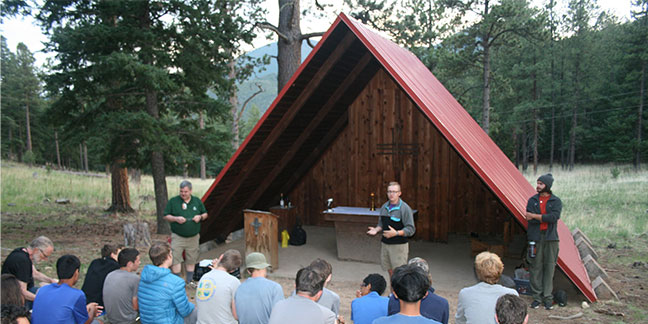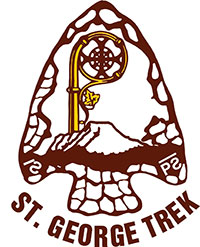Getting closer to God
 Scouts gathered at the chapel at the Cimarroncito campsite (Provided photos)Two Boy Scouts from the Diocese of Charlotte took a long hike this summer through “God’s country.”
Scouts gathered at the chapel at the Cimarroncito campsite (Provided photos)Two Boy Scouts from the Diocese of Charlotte took a long hike this summer through “God’s country.”
Caleb Laney and Joseph Wood were among 70 Catholic Scouts from across the U.S. who tackled the St. George Trek at Philmont Scout Ranch in July.
A 140,000-acre ranch in Cimarron, New Mexico, Philmont is home to the Boy Scouts of America’s premier high adventure camp. Each year, thousands of Scouts venture there for two-week hikes – backpacking 5 to 12 miles a day through isolated wilderness in New Mexico’s Sangre de Cristo Range of the Rocky Mountains at elevations of 6,500 to 12,500 feet, well into the range where altitude sickness kicks in.
The St. George Trek – named for the patron saint of Scouting – is a Philmont adventure designed for older Catholic Scouts who want to deepen their faith while taking on physical challenges. Held every two years, the trek layers on daily Mass, prayer, reflections and deep conversation about life’s purpose to all that Philmont offers.
“The primary goal of the St. George Trek,” Father Mike Santangelo tells folks as trek director, “is to provide participants with an opportunity to consider where God may be calling them.”
At the end of the 11-day challenge, Scouts commit to further discerning their life’s vocation and staying involved in the Church.
Caleb and Joseph were selected to represent the Diocese of Charlotte on the St. George Trek by the Charlotte Diocese Catholic Committee on Scouting.
On July 6, the two Scouts flew 1,500 miles from Charlotte to Albuquerque. They were assigned to different crews when they arrived: Caleb to Crew 1 and Joseph to Crew 3. The 12- to 13-member crews spent the next day getting to know each other, planning and packing, and beginning their reflections and attendance at daily Mass. On July 8, they boarded buses for the Philmont ranch.
Caleb and Joseph’s crews were supposed to hike different paths, meet on Day 6 for a retreat, then hike a few more days back to pick-up points. But not everything went according to plan.
|
Caleb Laney Parvuli Dei (Cub Scouts) |
Joseph Wood Parvuli Dei (Cub Scouts); Ad Altare Dei (Boy Scouts) |
CALEB’S TREK
Like many Boy Scouts, Caleb Laney, 17, wanted to test himself against the rigors of Philmont, but he also wanted more.
Caleb lives in Peachland, population 380, where the closest Boy Scout troop is 589, chartered by Pleasant Hill United Methodist Church in the even smaller town of McFarlan. Both towns are in rural Anson County, 40 miles east of Charlotte. He and his family attend Our Lady of Lourdes Church in Monroe.
Caleb and his sister are the only Catholic students in their high school, he said.
Going on the St. George Trek, Caleb hoped to be around “more Catholics and be around more people my age.”
He was happy to join a dozen Catholic Scouts in Crew 1 – just what he’d hoped for.
On Day 1, Caleb’s crew embarked on the trail to Lovers Leap, then went on to hike around Crater Lake to Miners Park for rock climbing. On Day 3, it was up Black Mountain for black powder rifle shooting, then a Day 4 stop at Cypher’s Mine, where gold had once been discovered and ghosts were said to remain.
Beyond the physical challenges of Philmont, the crews had Mass every day, with opportunities for penance and reconciliation. Two adults – one a priest – hiked with each crew.
Daily Mass “was new to me,” Caleb said. “It was nice, though. A nice quiet part of the day.”
Mass wasn’t at a set time, he said. “It depended on what we wanted to do. If we wanted to go to a peak – say, ‘Let’s have Mass on the peak,’ we’d do that. Or if we wanted to have it around lunch, we’d do that.”
SKIES OPEN UP
On the fifth day, Caleb’s crew began Mass atop Black Mountain, a dominant feature on the Philmont landscape. Then it started to hail.
A hailstorm was no problem for the Scouts, though – they used their ponchos to shield the priest and makeshift altar.
“After the Mass, we got under some trees. Lightning moved in for about 40 minutes,” he said. “After that we had to boogie down the mountain.”
The crew then pressed on for Cimarroncito, a camp area that also features a little covered chapel and outdoor benches, for a mid-trek retreat.
But on Day 6, COVID-19 struck. Someone tested positive and Caleb’s crew was dispatched to Philmont’s quarantine camp.
“We were ‘unclean,’” Caleb joked.
The commissary brought his crew meals each day. The Scouts could venture out for day hikes but had to return to “Quarantine Camp” each night.
Their first day there, it hailed again. They ended up spending the day in their tents.
Yet the Scouts soon made the best of the unexpected situation – setting their sights on climbing the Tooth of Time.
The intimidating rock outcrop along the Santa Fe Trail juts upward 9,003 feet. With a sheer rock face, it has become Philmont’s most recognizable symbol, named for its tooth-like shape and its signal to traders heading west in the 1800s that Santa Fe was only seven days away.
As the Scouts set out for the hike, the day began with clear skies. A crewmate caught a photo of Caleb greeting the morning sun with outstretched arms.
The crew decided to have their final Sunday Mass atop the Tooth of Time.
Caleb appreciated that the St. George Trek didn’t prioritize the religious aspect over the Philmont part, or vice versa. To him, both were important.
“It definitely made me more confident to be around other people my age who are Catholic,” he said. “I absolutely loved being able to have a spiritual journey and have a journey through God’s country.”
JOSEPH’S TREK
At 15, Joseph Wood’s journey began not in a tiny town but in Troop 8 – the largest Catholic troop in one of the largest Catholic parishes in the nation: St. Matthew.
Troop 8 goes on Philmont treks every two years, but Joseph recognized the St. George Trek, with its Catholic component, offered something different.
The longest Joseph had hiked before Philmont was a “shakedown” trek he and Caleb did together on Crowders Mountain in Gaston County, a 10-mile overnight dress rehearsal with full pack and gear to prepare for the St. George Trek.
“At Philmont, it was 50, 60, 70 miles” over the course of 12 days, he recalled.
He knows that because his crew leader’s fitness tracker helped chart their distance, recording 14 miles one day, until it ran out of power and the boys had to switch to rough estimates using maps.
Facebook posts also tracked Joseph’s journey. On July 13, photos show Crew 3 reaching Hunting Lodge Camp, a clearing in the woods with an historic log cabin.
The Scouts are wearing jackets and look considerably grimier than in the fresh-faced photos from their arrival.
Joseph’s crew also embraced daily Mass during their trek, participating in the sacrament of penance, talks and reflections. On July 15, Crew 3 reached Cimarroncito. There Joseph and his crewmates attended Mass with Bishop R. Daniel Conlon, the U.S. bishops’ liaison to the National Catholic Committee on Scouting.
Talks from seminarians, conversion stories, and discussions about the lives of saints made the daylong retreat a reflective time, Joseph said.
The break wasn’t all reflection, however. Crews 2 and 3 also undertook a service project while at Cimarroncito, helping clean up a small part of the nearby “burn scar,” where 27,000 acres had been damaged in a 2018 wildfire.
MIND, BODY AND SOUL
Joseph appreciated the break in the middle from the exhausting trek.
Hiking at a high elevation on the third day, he recalled, “I was having a hard time. My pack was heavy.”
But on Day 6, at retreat, the Scouts rested “mind, body and soul,” Joseph said. After that, “I was ready to do the next half, feeling nice and refreshed.”
The St. George Trek “was more than what I thought it would be,” he said. “I didn’t realize there would be talks; I didn’t know there would be Mass, not every day. I didn’t know how into the faith it was going to be. I was pleasantly surprised by that.”
Doing the trek and absorbing the seminarians’ vocation stories, Joseph began to think about what his own vocation might be.
“They asked, ‘What are you called to do? What do you think God is calling you to?’”
Joseph said he prayed a rosary one night while thinking about those questions.
“While you are out in the backcountry, hiking, you have a lot of time to yourself, thinking …” he said. “I need to pray about it more and ask God what He wants me to do.”
“Philmont, it’s a great experience,” he added. “It’s hard…You learn about yourself. And if you do the St. George Trek, you learn even more about yourself.”
— Stephen Guilfoyle
 Scouts: Explore your faith
Scouts: Explore your faith
The Charlotte Diocese Catholic Committee on Scouting selects two Scouts for the St. George Trek, which happens every two years at Philmont Scout Ranch in New Mexico.
The committee covers the registration fee of $925 per person, and families cover travel costs proper hiking gear.
Committee chairman Mike Nielsen encourages more Scouts to apply: “It is a unique opportunity for Scouts to spend nearly two weeks in the backcountry of Philmont Scout Ranch with priests, deacons and seminarians – not only enjoying the beauty and majesty of nature but also exploring their faith, values, morality, spirituality and vocations as young Catholic men and women with fellow Scouts from all over the U.S.”
For more info, go to www.nccs-bsa.org.


 Age: 17
Age: 17 Age: 15
Age: 15 Scouts: Explore your faith
Scouts: Explore your faith





